We’ve been big fans of Vermont poet James Crews for a long time. He was one of the featured poets at our very first Poetry & Pie event! It is a great delight to share with you a brand new Reading List on a topic that James knows so well, “Books to Cultivate Resilience During Tough Times.”
James is currently offering a webinar with fellow poet Danusha Laméris titled “Poetry of Resilience.” This six-week journey will involve reading poems together, enjoying craft talks with James and Danusha as well as a stellar list of special guest poets, including Carolyn Forché, Michael Kleber-Diggs, Maggie Smith, Angela Narciso-Torres, Kim Stafford, and Laure-Anne Bosselaar. The webinar begins on Friday, September 3, and continues every Friday through October 8. Friends, this is not to be missed! For more information about the webinar and to register, please visit the Poetry of Resilience Eventbrite page.
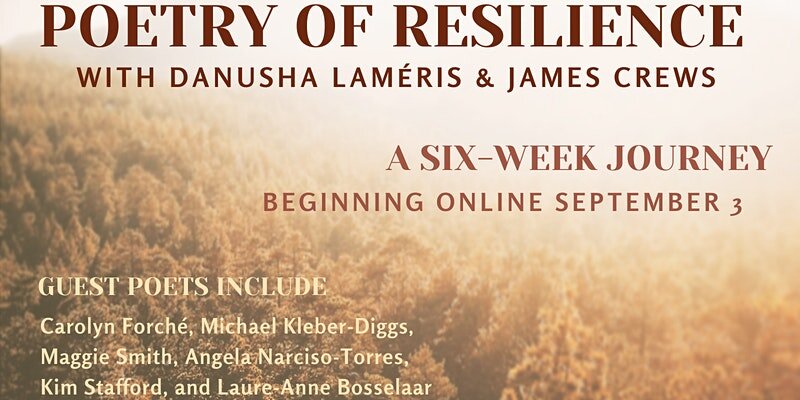
James has four wonderful collections of poetry out in the world: The Book of What Stays, Telling My Father, Bluebird, and the recently released, Every Waking Moment, in addition to two fantastic anthologies, How to Love the World and Healing the Divide.
Thank you, James, for sharing this beautiful list of books with us!
Books to Cultivate Resilience During Tough Times
The Latin origin of the word resilient means “to spring back.” Now, more than ever, we’re talking about resilience as a necessary quality for surviving this world, yet our culture often expects us to spring back instantly (and too quickly) to our former lives and former selves.
We’ve seen evidence of this mostly recently during the pandemic when, just because so many of us were being vaccinated, we wanted to believe that daily life could simply return to normal. I prefer to think of resilience as an ability to stretch our hearts and minds, not so that we can go back to the ways we were, but so that we can hold all the seemingly contradictory emotions that show up during the most difficult of times—the joy and fear, disappointment, and courage that will surely shape us and help us grow along the way.
I feel that poetry proves that there’s room for all of it, and the books below have been great sources of hope and comfort for me as I struggle to say sane, present, and creative during these unprecedented times. —JC
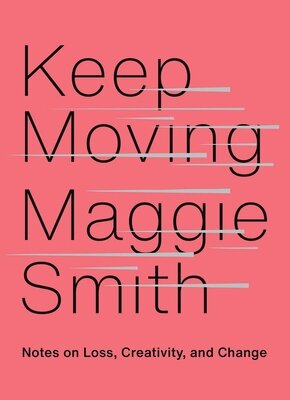
Keep Moving: Notes on Loss, Creativity, and Change, by Maggie Smith
This is a book written for our moment. Though not a collection of poetry, I found the encouragements and poetic reflections included here both illuminating and inspiring, and the book is small enough to fit in a purse or bag, to give as a gift to someone who might be going through their own loss or transition. Keep Moving (like her recently released and excellent poetry collection, Goldenrod) was written in the wake of a divorce, and she meditates on brokenness in the most beautiful and honest of ways, relating resilience to the Japanese practice of kintsugi by which, she writes, “The artists don’t hide the cracks in the bowl—they fill them with lacquer dusted with powdered gold, silver, or platinum, so that its seams gleam where it was pieced back together.” What a useful way to think of ourselves and our world during these difficult times.
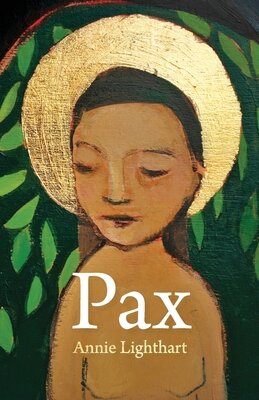
Pax, by Annie Lighthart
I’ve been a fan of Annie Lighthart’s gorgeous and taut poems ever since her first collection, Iron String, was published. Her poems are deeply spiritual, yet grounded in the actual world, and they so often bring me into a meditative, more attentive space in my own daily life. The poems in Pax show a speaker struggling to hold on to peace and love in the midst of raising a family, against the backdrop of such an uncertain moment in our lives. At their heart, these poems are about the small transformations that make all the difference in leading a more resilient, present life. One of my favorite poems from the book is “Let This Day,” which begins like this: “Let this day born in sackcloth and ashes / shift. Let it change, rearrange. Let it come back / made new and barking, snout pushed to table / with joy.” Who doesn’t need to change and rearrange certain days when nothing seems to go right?
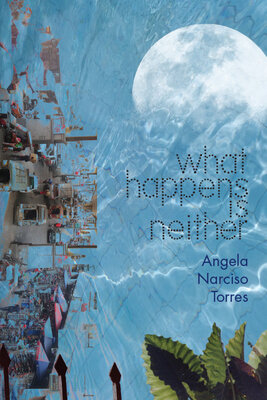
What Happens Is Neither, by Angela Narcisco Torres
As soon as I started reading it, I couldn’t put down What Happens Is Neither, Angela Narciso Torres’ second full-length collection of poetry. The poems are wide-ranging, and explore memory and loss as much as they delight in the everyday tasks and rituals that can nourish us, if we allow them to. So often confined this past year, I found great comfort in these poems that seemed to sanctify things as simple as folding the laundry, meeting with a friend at a coffee shop, or taking a bath. In “Self-Portrait as Water,” for instance, she so accurately describes that feeling of being submerged: “why does the body feel / more beautiful underwater— / is what goes through me // when I break the glass / surface, / levels rising as I plumb / the tub’s white womb . . .” The poems in this book stay with me long after I put them down, too, and I promise that after you read “Chore,” doing the laundry will never be the same for you.

Everything Comes Next: Collected & New Poems, by Naomi Shihab Nye
A new collection of poems by Young People’s Poet Laureate Naomi Shihab Nye is always a cause for celebration. The intention of her clear and accessible poems is not only to uplift readers (though she does that over and over), but also to surprise herself and each of us at the same time. Her poems are unafraid to take turns, interrogate, and find meaning in the most ordinary experiences—shopping for tomatoes at the supermarket, a child “kissing a window,” or the freedom inherent in a “torn map.” Though targeted toward younger readers, Everything Comes Next will delight people of all ages at every turn and collects many of Nye’s most famous and beloved poems like “Red Brocade,” “Gate A-4,” and “Kindness,” in which she writes: “Before you know what kindness really is / you must lose things / feel the future dissolve in a moment/like salt in a weakened broth.”
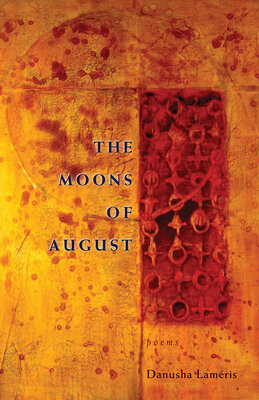
The Moons of August, by Danusha Laméris
This first collection of poetry by Danusha Laméris has been a faithful companion for me over the last year. Her poems ring with clarity, layered complexity, and empathy for the people and natural world around her. These poems uplift with their fearless honesty, and though some of the pieces in The Moons of August deal with the loss of her young son and brother, I always come away from this book feeling lighter and more hopeful. In this collection, and in her most recent and transcendent book, Bonfire Opera, Laméris gives us all permission to feel deeply, to stay gentle and forgiving toward ourselves even during the worst trials of our lives. Her classic, “Insha’Allah” is worth the price of admission alone: “How lightly we learn to hold hope, / as if it were an animal that could turn around / and bite your hand. And still we carry it / the way a mother would, carefully, / from one day to the next.” I can’t think of a better way to describe the seemingly tenuous, but ultimately tender nature of hope at this moment.

James Crews is the editor of the best-selling anthology How to Love the World, which has been featured on NPR’s Morning Edition, as well as in The Boston Globe and The Washington Post. He is the author of four prize-winning collections of poetry: The Book of What Stays, Telling My Father, Bluebird, and Every Waking Moment, and his poems have been reprinted in the New York Times Magazine, Ploughshares, The New Republic, and The Christian Century. Crews teaches poetry at the University at Albany and lives with his husband in Shaftsbury, Vermont.